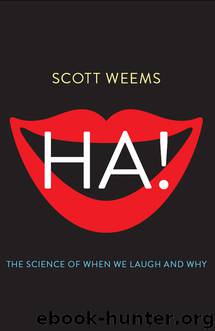Ha! by Scott Weems

Author:Scott Weems [Weems, Scott]
Format: epub, mobi
ISBN: 9780465080809
Publisher: Basic Books
I would like to end this chapter with a story from my first year in graduate school, back when I was a young scientist. I was attending a neuroanatomy class taught by Arnold Scheibel, one of the most respected neuroscientists in the country. When someone was needed to examine Einstein’s brain to identify the source of his genius, one of the people chosen was Arnold Scheibel. We used to joke that Scheibel invented the neuron, when really he was just among the first to discover how they communicate.
Dr. Scheibel was known for being a rather direct, serious teacher, occasionally making jokes but mostly dispensing vast amounts of information and expecting his students to keep up. One morning, in a complete break of routine, Scheibel opened the class by announcing that at the end of his lecture he would share his recently discovered secret of life. Without a pause he proceeded with his lecture, and for the rest of the session we were left to wonder whether he was serious. Scheibel wasn’t one to exaggerate, so his claim seemed real. Finally, with only a few minutes before the class was scheduled to end, he returned to his promise.
“So, now on to the meaning of life,” he said, sounding like a computer in a Douglas Adams story.
“The secret is, simply, keeping salt out,” he said. Philosophers and religious scholars can question the purpose of our existence all they want, but life serves one main goal, and that’s keeping salt on the correct side of our cellular membranes. All neurons are inherently polarized, meaning that they hold a negative charge relative to their surroundings. That charge is maintained by keeping positively charged sodium ions outside the cell body, while potassium and other chemicals are given free passage. When neurons need to communicate, sodium ions are allowed briefly inside so that an electrical current is formed, thus triggering a chemical chain reaction and transfer of information to other cells. If the process breaks down and sodium travels freely through our cellular membranes, our neurons no longer function and we quickly die. That’s why without at least some sodium in our diet, we risk severe health consequences, because this transport of salt is essential. Too much sodium is dangerous too, because that threatens the heart, leading to hypertension and even cardiac arrest. Indeed, if there’s one thing that life couldn’t exist without—or, to put it another way, if there’s one thing life was designed to perpetuate—it’s the keeping of salt outside our cellular membranes.
“And so, that is the secret of life,” Scheibel claimed. The lesson was over. What many neurophysiologists merely call the sodium pump had been elevated to the reason for our existence.
I was fortunate to have the opportunity to share this story once with Margaret Boden, who has written about the sodium pump herself—and she was fascinated, but skeptical too. It seems the solution could just as easily have been ATP, she claimed. Otherwise known as adenosine triphosphate, ATP is an unstable chemical molecule used for energy storage.
Download
This site does not store any files on its server. We only index and link to content provided by other sites. Please contact the content providers to delete copyright contents if any and email us, we'll remove relevant links or contents immediately.
Should I Stay or Should I Go? by Ramani Durvasula(6784)
Why We Sleep: Unlocking the Power of Sleep and Dreams by Matthew Walker(5641)
Fear by Osho(4085)
Flow by Mihaly Csikszentmihalyi(4052)
Rising Strong by Brene Brown(3780)
Why We Sleep by Matthew Walker(3771)
Too Much and Not the Mood by Durga Chew-Bose(3693)
How to Change Your Mind by Michael Pollan(3676)
The Hacking of the American Mind by Robert H. Lustig(3580)
Lost Connections by Johann Hari(3455)
He's Just Not That Into You by Greg Behrendt & Liz Tuccillo(3300)
Evolve Your Brain by Joe Dispenza(3050)
What If This Were Enough? by Heather Havrilesky(2945)
Resisting Happiness by Matthew Kelly(2887)
Crazy Is My Superpower by A.J. Mendez Brooks(2860)
The Courage to Be Disliked by Ichiro Kishimi & Fumitake Koga(2796)
The Book of Human Emotions by Tiffany Watt Smith(2770)
Descartes' Error by Antonio Damasio(2731)
In Cold Blood by Truman Capote(2685)
